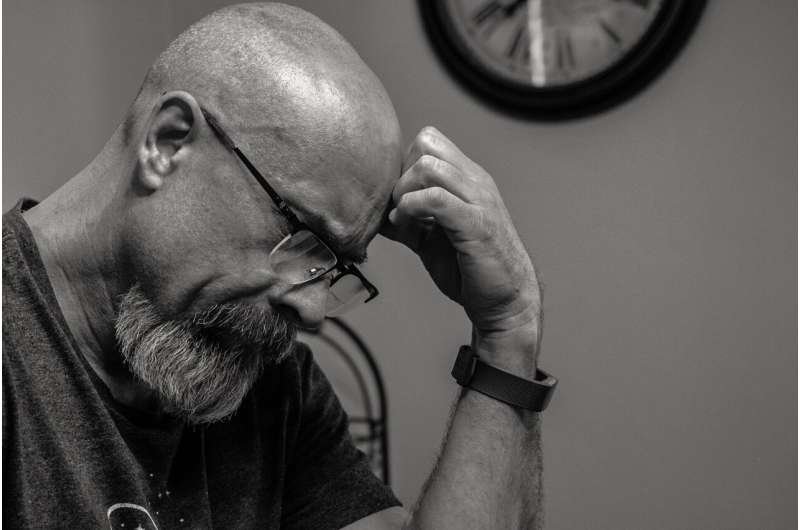
Psychology theories suggest that humans tend to primarily invest significant mental resources on problems that will reward them for their efforts. More specifically, they propose that before they start thinking in great depth about a problem, humans ponder on whether the benefits of solving it outweigh the "cost" in terms of required mental efforts.
While quite a few theoretical works examined this cost-benefit trade-off and hypothesized about how humans decide the mental energy they will invest on a given problem, experiments on this topic remain scarce. One reason for this is that there are still no reliable and well-established measures of this anticipatory evaluation process.
Researchers at McGill University in Canada and Radboud University in the Netherlands recently carried out a study looking at how specific muscles in the face respond when humans are pondering on the mental costs and rewards of a complex problem. Their paper, published in Cognitive, Affective, & Behavioral Neuroscience, suggests that activity in the corrugator, the muscle responsible for eyebrow forehead and eyebrow movements, such as frowning, could reflect this distinct and experimentally elusive decision-making process.
"People do not usually like to think hard and, indeed, they avoid exerting mental effort when possible," Sean Devine, one of the researchers who carried out the study, told Medical Xpress. "Nevertheless, many daily tasks require us to spend mental resources to accomplish our goals—for example, we complete our homework to get better grades, we do our taxes to fulfill our civic duties, and we read complicated scientific articles to learn more about the world around us.
"To explain how humans make these effort-related decisions, dominant theories in cognitive science propose that we exert mental effort when the costs of effort (i.e., the mental work necessary to complete a task) are outweighed by its benefits (the rewards that putting in the effort affords). However, up until now, these costs and benefits remained abstract and theoretical, and it was unclear how they are experienced by humans during mental effort exertions."
Despite the theoretical predictions put forward in the past, it is still unclear whether humans actually feel aversive towards the high mental costs of complex problems and experience their potential benefits as pleasurable. Devine and his colleagues set out to explore this possibility in an experimental setting, using electrophysiological measures of transient emotions, which they refer to as "affect."
Measuring affect can be challenging, as it is transient by nature and thus typically dissipates very quickly. The researchers tried to observe these transient changes by recording the fast-occurring (sub-second) activity of two facial muscle groups known to reflect positive and negative affect using a technique known as facial electromyography (fEMG). They specifically focused on the zygomaticus and the corrugator supercilii muscles.
"The zygomaticus is a muscle that extends from the cheekbone to the corner of the mouth and is responsible for smiling," Devine explained. "The corrugator supercilii muscles are a small muscle group close to the eyes, located at the end of the eyebrow, involved in frowning, and associated with negative affect. Using fEMG, we were able to analyze how momentary fluctuations in affect accompanied the exertion of mental effort—namely, the completion of demanding mental arithmetic for different amounts of bonus money."
Essentially, Devine and his colleagues asked 44 adults to complete a demanding mental arithmetic task for which they would receive course credits. Before they completed the some of the tasks, the participants were told how difficult they would be, using a visual cue (i.e., a thermometer filled to various heights).
Using fEMG, the researchers recorded the activity of their two muscle groups of interest as the participants were presented with this cue, which is when they would be theoretically engaging in the cost-reward task evaluation process, as well as when they were completing the arithmetic problems. Overall, they found that an increased mental effort was associated with greater activity in the corrugator, the muscle responsible for maintaining or changing the position of eyebrows.
"Interestingly, we also found that corrugator activity was reduced when completing a complicated arithmetic problem for the possibility of higher amounts of money," Devine said. "These results are interesting because they extend the cost-benefit theory of mental effort, suggesting that one mechanism by which humans decide how much effort they should put into a task is by weighing the immediate negative feelings associated with mental effort against the positive feelings about the possible benefits."
The recent study by this team of researchers appears to confirm psychological theories related to the anticipatory evaluation of the mental costs and benefits of tackling complex problems. Notably, it also introduced a promising measure for mental effort, namely the fEMG-recorded movements of corrugator supercilii muscles, which could be soon used to conduct further experiments on this topic.
"In this study, we measured fEMG activity while people solved mentally demanding math problems," Devine added. "In the future, we are interested in how activity in these facial muscles might predict people's explicit choices about effort. For example, if corrugator activity is high, are people more likely to avoid doing a highly demanding mental task?"
More information: Sean Devine et al, More than a feeling: physiological measures of affect index the integration of effort costs and rewards during anticipatory effort evaluation, Cognitive, Affective, & Behavioral Neuroscience (2023). DOI: 10.3758/s13415-023-01095-3
© 2023 Science X Network
Citation: Study shows that thinking hard about complex problems results in distinct facial muscle movement patterns (2023, May 3) retrieved 3 May 2023 from https://medicalxpress.com/news/2023-05-hard-complex-problems-results-distinct.html
This document is subject to copyright. Apart from any fair dealing for the purpose of private study or research, no part may be reproduced without the written permission. The content is provided for information purposes only.
May 03, 2023 at 09:12PM
https://news.google.com/rss/articles/CBMiUmh0dHBzOi8vbWVkaWNhbHhwcmVzcy5jb20vbmV3cy8yMDIzLTA1LWhhcmQtY29tcGxleC1wcm9ibGVtcy1yZXN1bHRzLWRpc3RpbmN0Lmh0bWzSAVFodHRwczovL21lZGljYWx4cHJlc3MuY29tL25ld3MvMjAyMy0wNS1oYXJkLWNvbXBsZXgtcHJvYmxlbXMtcmVzdWx0cy1kaXN0aW5jdC5hbXA?oc=5
Study shows that thinking hard about complex problems results in distinct facial muscle movement patterns - Medical Xpress
https://news.google.com/search?q=hard&hl=en-US&gl=US&ceid=US:en
No comments:
Post a Comment